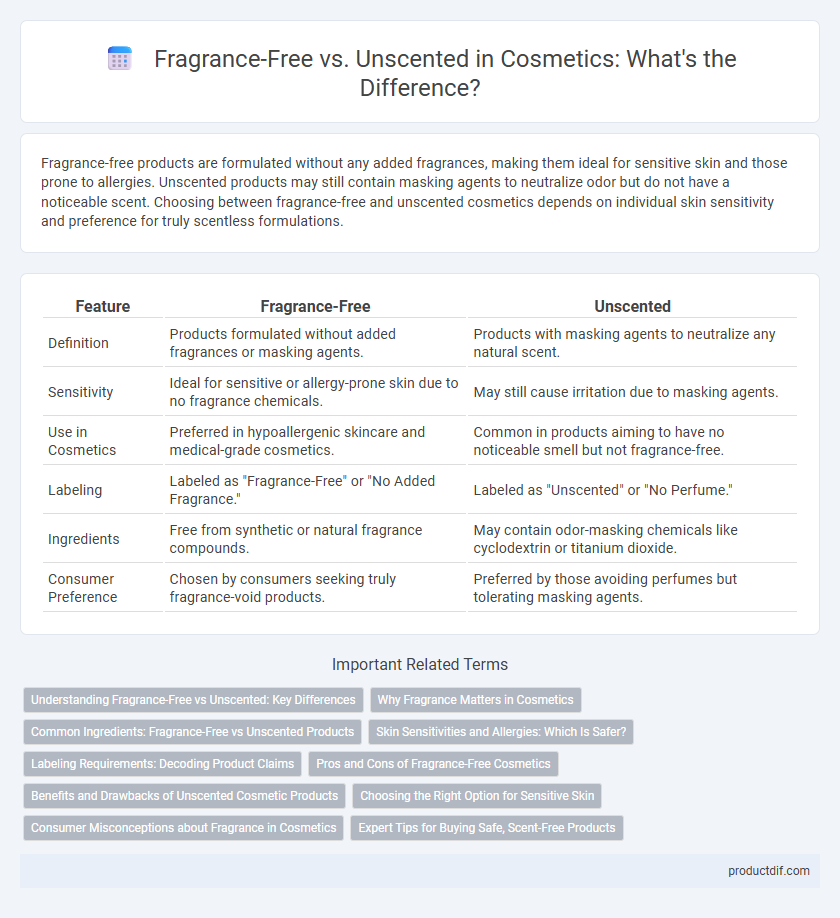Fragrance-free products are formulated without any added fragrances, making them ideal for sensitive skin and those prone to allergies. Unscented products may still contain masking agents to neutralize odor but do not have a noticeable scent. Choosing between fragrance-free and unscented cosmetics depends on individual skin sensitivity and preference for truly scentless formulations.
Table of Comparison
| Feature | Fragrance-Free | Unscented |
|---|---|---|
| Definition | Products formulated without added fragrances or masking agents. | Products with masking agents to neutralize any natural scent. |
| Sensitivity | Ideal for sensitive or allergy-prone skin due to no fragrance chemicals. | May still cause irritation due to masking agents. |
| Use in Cosmetics | Preferred in hypoallergenic skincare and medical-grade cosmetics. | Common in products aiming to have no noticeable smell but not fragrance-free. |
| Labeling | Labeled as "Fragrance-Free" or "No Added Fragrance." | Labeled as "Unscented" or "No Perfume." |
| Ingredients | Free from synthetic or natural fragrance compounds. | May contain odor-masking chemicals like cyclodextrin or titanium dioxide. |
| Consumer Preference | Chosen by consumers seeking truly fragrance-void products. | Preferred by those avoiding perfumes but tolerating masking agents. |
Understanding Fragrance-Free vs Unscented: Key Differences
Fragrance-free products contain no added fragrances, which means they do not have any scent or masking agents, making them ideal for sensitive skin prone to irritation. Unscented products may still contain masking fragrances designed to neutralize the natural odor of ingredients, so they are not completely free of fragrance chemicals. Choosing between fragrance-free and unscented cosmetics depends on the level of skin sensitivity and preference for entirely scent-free formulations.
Why Fragrance Matters in Cosmetics
Fragrance matters in cosmetics because it directly impacts skin sensitivity and allergic reactions, making fragrance-free products essential for individuals with dermatitis or eczema. Unscented cosmetics eliminate masking scents but may still contain fragrance ingredients, which can trigger irritation. Choosing truly fragrance-free products ensures gentler formulations suitable for sensitive skin and reduces potential harmful effects caused by synthetic fragrances.
Common Ingredients: Fragrance-Free vs Unscented Products
Fragrance-free products typically exclude synthetic fragrances but may contain masking agents to neutralize odors, while unscented products are formulated to have no detectable scent, often free from both fragrances and masking agents. Common ingredients in fragrance-free cosmetics include botanical extracts and mild surfactants designed to minimize irritation without altering natural scent. Unscented products often rely on hypoallergenic, neutral carriers like mineral oil or glycerin to maintain product stability while eliminating all odor.
Skin Sensitivities and Allergies: Which Is Safer?
Fragrance-free products contain no added fragrances but may still include masking agents, while unscented products have scents neutralized to be less noticeable, potentially exposing sensitive skin to irritants. For individuals with skin sensitivities and allergies, fragrance-free options are generally safer because they minimize the risk of allergic reactions and contact dermatitis. Choosing formulations labeled as hypoallergenic and free from common irritants further reduces the chance of skin inflammation and irritation.
Labeling Requirements: Decoding Product Claims
Fragrance-free products must contain no fragrances or masking scents, making them suitable for sensitive skin, while unscented products may include masking agents to neutralize odors without adding fragrance. Labeling requirements mandate clear distinctions between these claims to prevent consumer confusion, with regulatory bodies ensuring accuracy and transparency on ingredient disclosures. Understanding these differences helps consumers make informed choices and comply with industry standards for allergen and sensitivity concerns.
Pros and Cons of Fragrance-Free Cosmetics
Fragrance-free cosmetics eliminate added scents, reducing the risk of allergic reactions and irritation, making them ideal for sensitive skin or those prone to eczema and rosacea. However, the absence of fragrance can result in a less pleasant sensory experience, potentially affecting user satisfaction and perceived product freshness. These products often use masking agents that can occasionally trigger sensitivities, so careful ingredient review is essential for optimal skin health.
Benefits and Drawbacks of Unscented Cosmetic Products
Unscented cosmetic products offer the benefit of minimizing skin irritation and allergic reactions, making them ideal for sensitive skin types and those prone to fragrance allergies. They provide a neutral option without masking natural body odors or adding artificial scents, which can be preferable for users seeking subtlety in their grooming routine. However, unscented products may lack the appealing sensory experience often associated with fragranced cosmetics, potentially limiting their attractiveness to consumers who enjoy aromatic skincare.
Choosing the Right Option for Sensitive Skin
Fragrance-free products contain no added fragrances or masking scents, making them ideal for sensitive skin prone to irritation. Unscented products may include masking agents to neutralize odors but can still harbor ingredients that trigger reactions in sensitive skin. Selecting fragrance-free options ensures a lower risk of allergic responses and maintains skin calmness, crucial for those with sensitivities.
Consumer Misconceptions about Fragrance in Cosmetics
Many consumers mistakenly believe that fragrance-free and unscented products are interchangeable, but fragrance-free cosmetics are formulated without any fragrance ingredients, while unscented products may contain masking agents to neutralize odors. This misconception often leads to confusion, especially among individuals with sensitive skin or allergies, as unscented products can still cause reactions despite lacking a noticeable scent. Understanding these distinctions helps consumers make informed choices to avoid irritation from hidden fragrances in cosmetic items.
Expert Tips for Buying Safe, Scent-Free Products
Fragrance-free products are formulated without added perfumes or masking scents, making them ideal for sensitive skin or allergies, while unscented products may contain ingredients that neutralize odors but still have subtle scents. Experts recommend checking ingredient labels for hidden fragrance components like parfum or essential oils to ensure the product truly suits sensitive skin. Opt for dermatologist-tested, hypoallergenic brands that clearly specify "fragrance-free" to minimize the risk of irritation and maintain skin safety.
Fragrance-free vs Unscented Infographic

 productdif.com
productdif.com